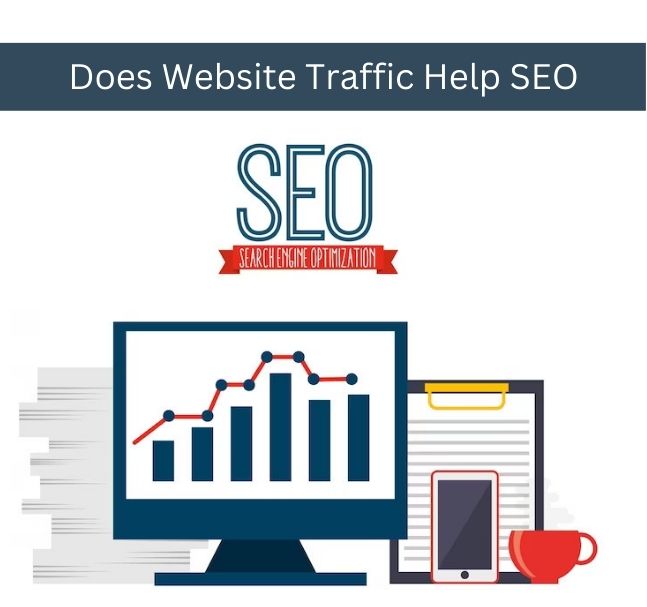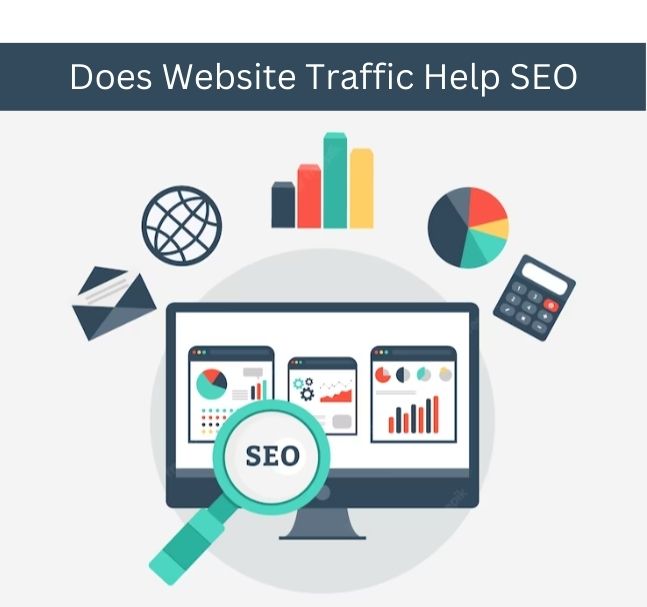Website traffic’s impact on SEO is a long-debated topic among website owners and marketers.
In this article, we will explore how website traffic can impact SEO and provide insights on strategies to increase website traffic.
Does Website Traffic Help SEO?
Yes, website traffic can have a positive impact on SEO, although it is not a direct ranking factor.
When a website receives more traffic, it signals to search engines that the website is providing value to users, which can boost its search engine rankings.
Also, when users spend more time on a website, it can improve its engagement metrics, such as dwell time and bounce rate, which can also positively impact SEO.

The Role of website traffic in search engine algorithms
Search engines like Google and Bing use complex algorithms to determine the rankings of websites on their SERPs.
While the exact algorithms are closely guarded secrets, it is widely believed that website traffic plays a role in determining rankings.
Websites with higher traffic are often considered more relevant and authoritative, which may positively impact their rankings.

The Impact of website traffic on keyword rankings
When users search for information on search engines, they enter specific words or phrases known as keywords. SEO efforts often focus on optimizing a website for specific keywords.
Website traffic can impact keyword rankings in several ways.
Firstly, websites with higher traffic tend to attract more backlinks and social media mentions, which can improve their authority and relevance for specific keywords.
Secondly, increased website traffic may lead to higher engagement metrics, such as:
- The longer time spent on the website
- Lower bounce rates
Which can signal to search engines that the website is providing valuable content and improve keyword rankings.

The Importance of quality website traffic for SEO
Not all website traffic is created equal.
Quality website traffic refers to visitors who are genuinely interested in the website’s content, products, or services and are likely to engage and convert.
High-quality website traffic is crucial for SEO, as it can lead to:
- Higher engagement metrics
- More backlinks
- Social media mentions
Which can all positively impact search engine rankings.
In contrast, low-quality traffic, such as visitors who bounce quickly or engage in spammy behavior, can negatively impact SEO by increasing bounce rates and reducing engagement metrics.
Irrelevant Traffic Doesn’t Help SEO
It is important to note that not all traffic is created equal, and irrelevant traffic can actually harm SEO rather than help it.
Increasing high-quality traffic on a website, with genuinely interested users, can boost engagement metrics.
It can also have a positive impact on SEO.
Poor quality traffic can harm SEO by increasing bounce rates and decreasing engagement metrics.
For instance, visitors who engage in spammy behavior or leave the website quickly.
It is essential to focus on attracting high-quality, relevant traffic to the website to improve SEO performance.
Is buying traffic good for SEO?
No, buying traffic is not good for SEO.
Google has complex and intelligent algorithms that can detect bot or automated traffic to a website.
This is because Google wants to provide its users with the best possible experience by ensuring that search results are relevant and trustworthy.
Therefore, it is important to avoid using bots or any other artificial means to generate traffic to a website
It could result in penalties or even a permanent ban from Google’s search results.

Strategies to improve website traffic
There are several strategies that website owners can implement to increase website traffic and improve SEO.
These include:
- Creating high-quality Relevant, and engaging content that caters to the needs of the target audience
- Optimizing the website for relevant keywords
- Improving user experience and website speed
- Utilizing social media and various marketing channels to increase website traffic.
- Establishing a sturdy backlink profile by reaching out to others and cultivating relationships.
Additionally, understanding and analyzing website traffic data through tools like Google Analytics can provide insights into visitor behavior and preferences.
It helps website owners make data-driven decisions to optimize their SEO efforts.

Different Types of Website Traffic
Here are some different types of website traffic:
- Organic traffic: Visitors who arrive at your website through a search engine’s organic search results.
- Direct traffic: Visitors who type in your website URL directly into their browser or click on a bookmarked link.
- Referral traffic: Visitors who arrive at your website through a link on another website.
- Social media traffic: Visitors who come to your website via social media platforms such as Facebook, Twitter, Instagram, and LinkedIn.
- Paid traffic: Visitors who arrive at your website through paid advertising campaigns such as Google AdWords or social media advertising.
- Email traffic: Visitors who click on links in email campaigns that lead to your website.
How much web traffic is SEO?
It is difficult to determine exactly how much web traffic is driven by SEO.
It can vary widely depending on the industry, the specific website, and the search engine algorithms being used.
However, studies have shown that organic search (which is driven by SEO) accounts for a significant portion of web traffic for many websites.
For example, a study by BrightEdge found that organic search was responsible for 53% of website traffic, compared to 15% from paid search and 5% from social media.
However, it is important to note that these figures can vary widely depending on the specific website and industry.
Will SEO increase the traffic on a website?
Yes, SEO can increase the traffic on a website.
Optimizing a website for SEO makes it more visible and accessible to users who are searching for relevant information in Search Engines.
This can lead to more organic (non-paid) traffic to the website, as well as higher click-through rates from search engine results pages.
However, it is important to note that SEO is a long-term process that requires ongoing effort and optimization.
Read:
Increase Website Traffic Through Social Media in 19 Ways
What is Organic Traffic: Explained From Basic


